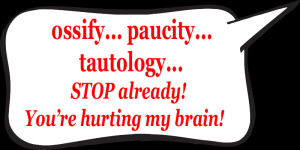 I’m sitting in the allergist’s office waiting out the required half hour and can always count on reading the Wall Street Journal during my weekly visit. Funny thing, no one else in 30 visits has ever glanced at that paper, out of a full waiting room. Week after week, over different times of the day and different days of the week. Umm, maybe it’s the content?
I’m sitting in the allergist’s office waiting out the required half hour and can always count on reading the Wall Street Journal during my weekly visit. Funny thing, no one else in 30 visits has ever glanced at that paper, out of a full waiting room. Week after week, over different times of the day and different days of the week. Umm, maybe it’s the content?
One headline describing a fancy car, said it “…drives as unctuously as…” Now my vocabulary’s pretty good, better than most, but I had trouble with that one as did my college educated husband. Two degrees and we can’t figure out what that word means, even in context. Now that’s highbrow writing.
What should be disturbing to the WSJ is not only did I not understand the word (and I’m a subscriber), and not that I didn’t care to learn the meaning, but that by using words not commonly understood distances me from the publication. I don’t like being made to feel stupid. And no media wants to distance readers, especially in this time of diminishing readership and fighting for every subscriber.
A consultant’s blog casually tossed out the word “propinquitous” as if it was no biggie. Hey, what?? Is that even a real word anyway? (trying to be the adjective form of some noun likely, with an unknown meaning to me.) But more to the point, who cares?? When you can’t pronounce it and when not knowing it makes you feel inferior, then the writer has a problem. Alienating readers is never a desirable point of writing.
How about this example of bad writing – bad because it’s boring and just not clear: “What you are looking for are the precipitators of the problem and the need to solve it. You are looking for galvanizing events or catalytic events….” Say, what? Besides being a muddy mouthful to get your brain around, it doesn’t pass the Who Cares? test (or better known as: who gives a sh**.)
It’s even more important with online writing to be clear, concise and easily understood. We only have time to scan most online content and long passages strain our eyesight with the low resolution and blue backlighting. It’s physically difficult to stare at a digital screen for hours. Plus there’s so much good stuff (You Tube) vying for our limited visual attention. Hard uncommon words and long boring paragraphs don’t stand a chance in the quick-quick world of online communication.
Keep it short. Short words, short sentences, short paragraphs. Lots of white space. Bullets are good. Skip the tight grammar rules. It’s really OK. Your old English teacher will never know. And make those words very very common, 3 syllables max (sub out any words that go 4 syllables or longer, like the 3 in the above example) When in doubt, consult the Flesch Reading Ease score, which is available inside every Word document (contained within the spell-check feature); strive for a Flesch score of 70 or higher. Which equates to a 6th grade reading level.
Now you’re saying, “Oh, no, no – MY audience is highly educated and I would never insult them by writing at a 6th grade level; they expect high level content from me and would look down on my expertise if I delivered sub-standard writing.” Rubbish. They will appreciate your bringing anything down to a 6th grade level, which makes any content much easier to grasp, scan, and digest quickly. And while appreciating the easy flow they’ll never even notice that it’s at a 6th grade level. Trust me on this. And thank me later when your stuff is actually read.
Newspapers used to write for an 8th grade reading level, and now they’ve dropped down to a 6th grade level. It’s not that people have become less educated or lazy readers; it’s that people are so busy all they have time for is to skim the paper. By dropping the reading level makes a paper easier to skim. And this is done for hard copy that doesn’t have the visual limitations of digital copy’s low screen resolution. Take the lead of newspapers and drop your high falutin’ vocabulary in your online writing, but only if you want to be read.
Next time the topic is: No news is good news – delivering good and bad news
Comment on any highbrow word experiences you care to recall. Not worth remembering, right? And what did you think about the person using the 50-cent words? Not so likable, eh?
Here are some 2-cent words for you: gobble, gobble – Happy Turkey Day!
